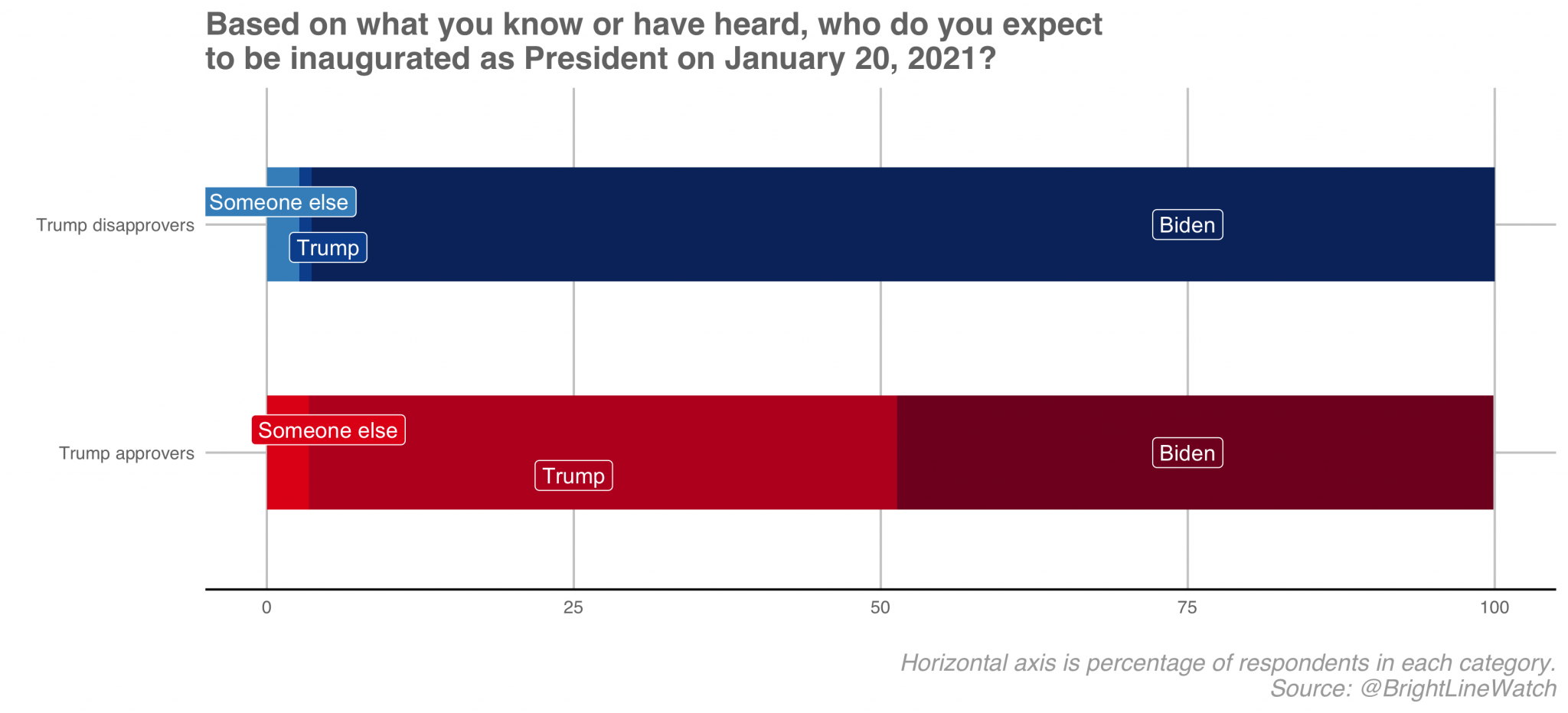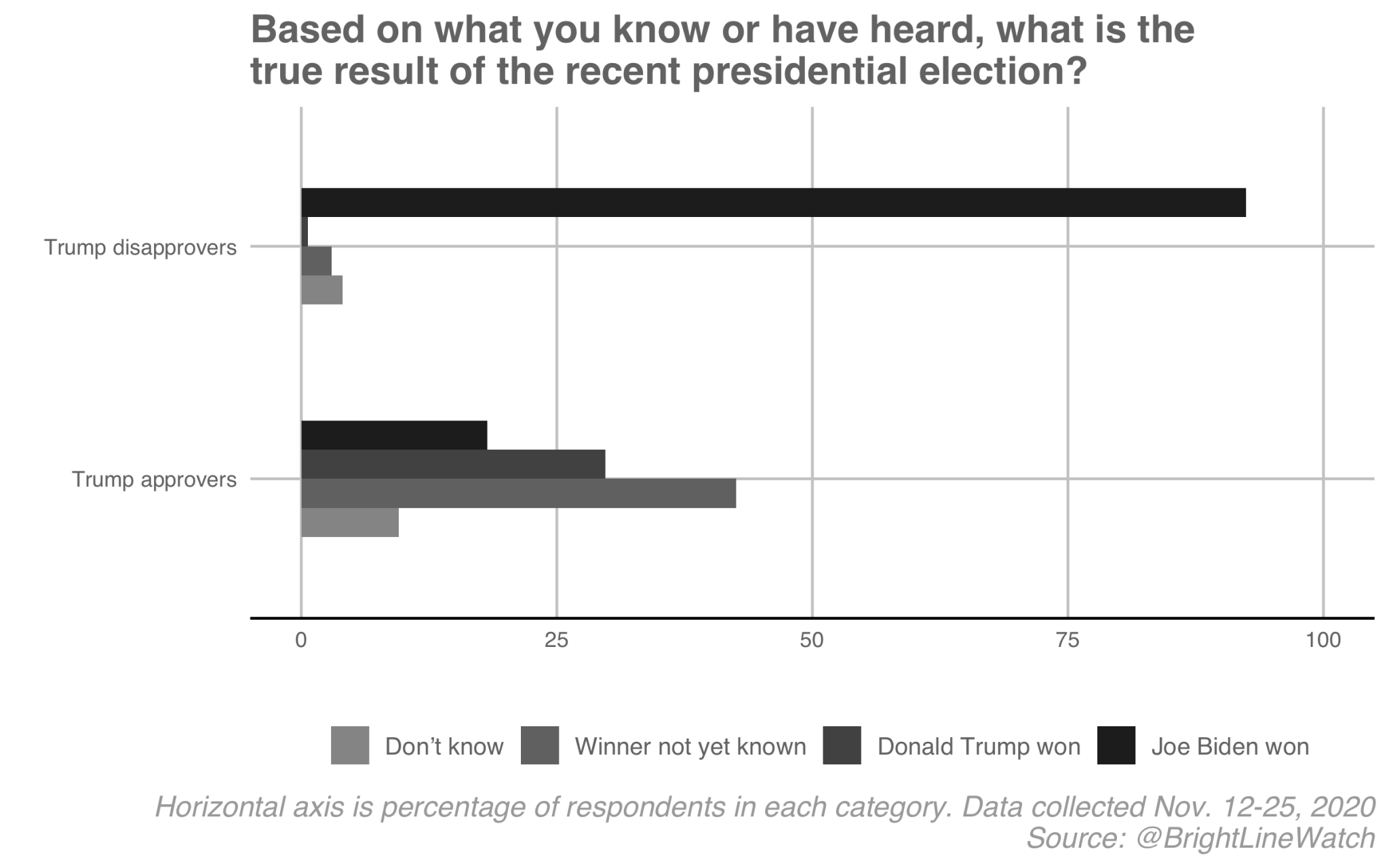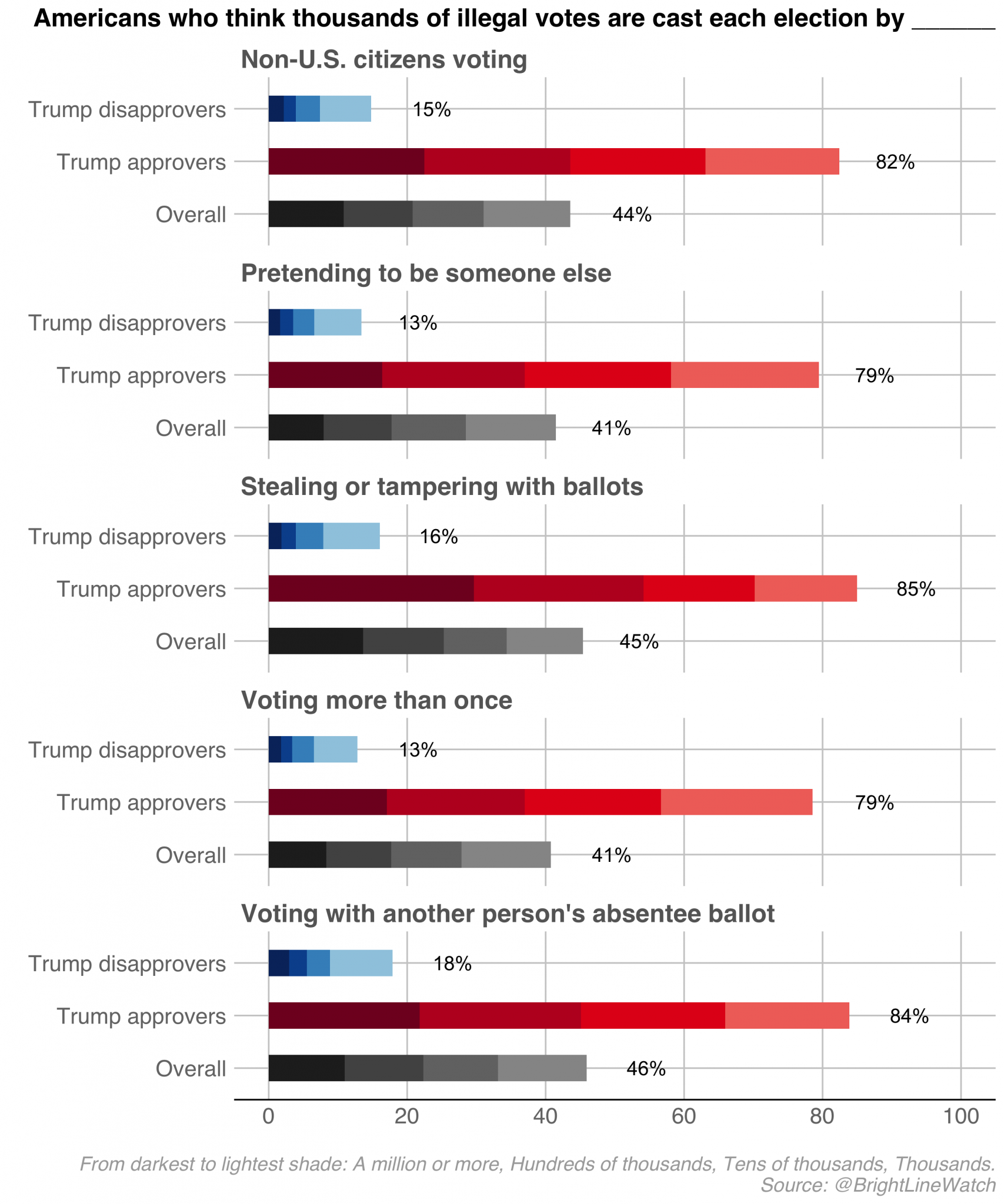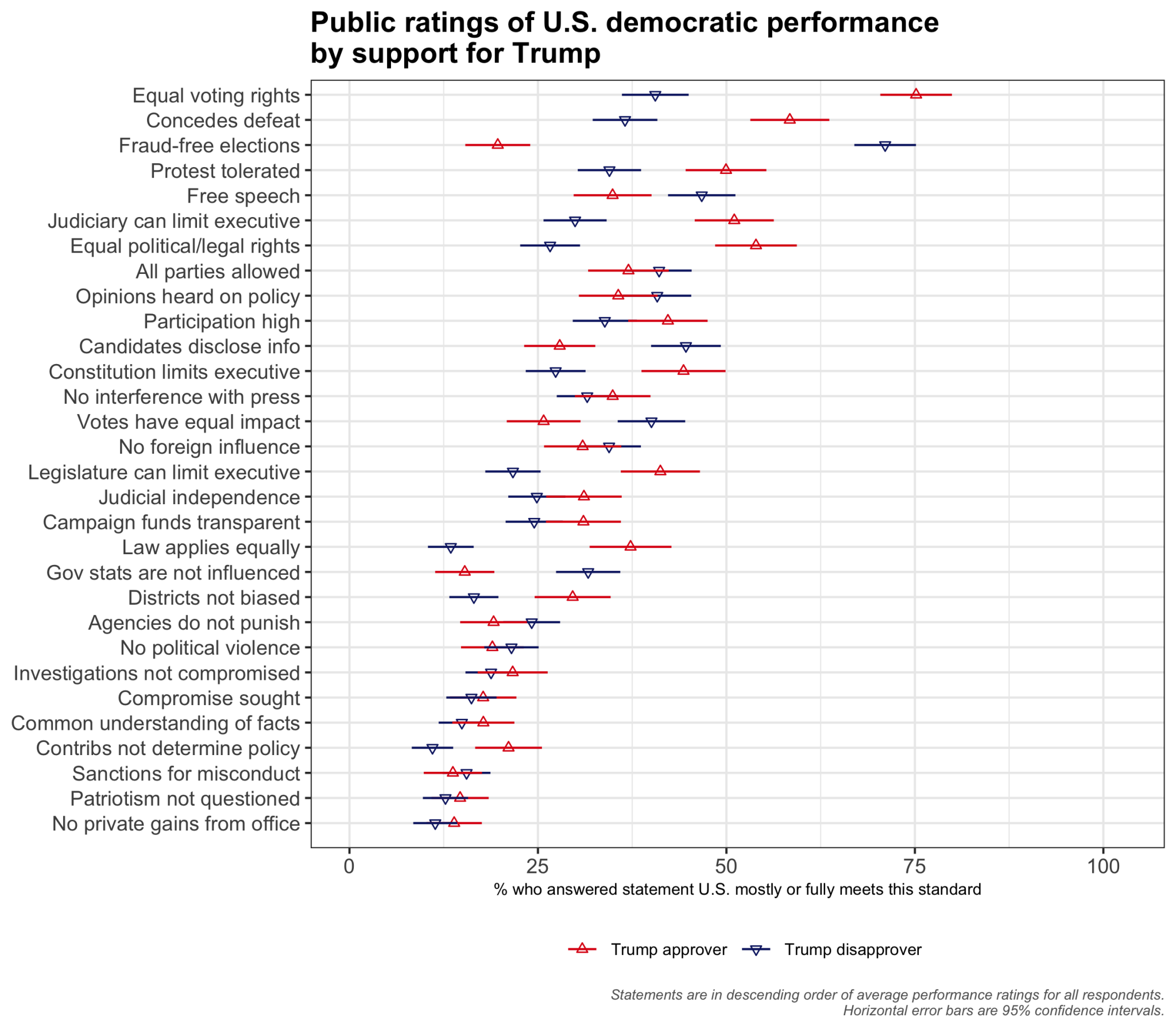
We’re in a period of political transition here in the United States, with the incoming Biden administration subject to the usual allotment of lobbying, questioning, and badgering — from interest groups, from industries, and from the media. “How will Biden’s new team treat the press?” CJR’s Jon Allsop asks. Can America again be a beacon of press freedom to the world? asks the Committee to Protect Journalists.
But all those questions depend on an underlying fact: that we really are in a period of political transition, and not merely in a temporary lull in National Donaldness — one that will end with the start of a second Trump term Jan. 20, once the kraken is finally released from what must be a truly bewildering and labyrinthine series of interlocking cages.
It’s become cliché to note that Democrats and Republicans live in different information universes, in large part as the result of conservative media lending credibility to conspiratorial ideas and viewing all things political through an oppositional lens. But how bad is the divide, anyway? We have some new data on that question, via Bright Line Watch, a collaboration of political science researchers interested in tracking the strength and/or weakness of American democracy in realtime. (Emily Badger also wrote up their findings for The New York Times.)
There are plenty of interesting (and by interesting I generally mean depressing) data points in the research, which draws on parallel surveys of both political science experts and John Q. Publics done earlier this month.
(Like: 48 percent of Trump supporters say they believe Trump will be sworn in for a second term on January 20. Really, 48 percent — read that sentence again! Not that he would be sworn in, if it weren’t for all those dastardly machine pols in The Big Cities who stole the election. Not that things would be better if he’d won. Nearly half believe he actually will be sworn in in a few weeks.)

(Kraken theism is a hell of a drug.)
But I’ll focus here on the elements most related to the media and the information ecosystem it helps feed, for better and for worse.
People know that the media has called the election Biden. More than 80 percent of both Trump supporters and opponents were aware that news organizations had a winner. And of those, 84 percent of Trump supporters (vs. 95 percent of opposers) said that it was Biden who’d been so declared. In other words, they’re aware of the information universe they’re living in; they just decline to believe it.

All of Trump’s stolen-election nonsense really changed hearts and minds. Among people who disapproved of Trump’s performance as president, 86 percent say Biden was “definitely” the rightful winner of the election, with another 9 percent saying he “probably” was. But among those who approve of Trump, only 8 percent say Biden is “definitely” the rightful winner, with another 17% saying “probably.” Trump approvers are almost twice as likely (30 percent vs. 18 percent) to say that Trump actually won than that Biden did; a majority of them say the winner isn’t yet clear.1

Related: Trump supporters think voter fraud is everywhere. Of five types of voter fraud described to respondents — voting by non-citizens, voting under a false identity, stealing or tampering with ballots, voting more than once, and voting with another person’s absentee ballot — 79% or more of Trump supporters said there were at least “thousands” of such illegal votes cast in the election. Roughly 20 percent whipped the scale of each type of voter fraud into the millions of votes. (In reality, voter fraud of these types is extremely rare.)

Experts took the media’s side on two big roles it played in the election. The expert panel of political scientists was asked to consider a number of potential threats to democracy that could arise in this cycle. One was Trump’s years-long drumbeat of attacks on the press, a.k.a. the “enemy of the people.” Another was the media’s traditional role in declaring an election winner — in this case, Biden. Experts rated Trump’s press bashing as the most threatening event for democracy and the media’s calling-it role the least threatening.

“These judgments reflect an expert consensus that freedom of the press and the peaceful transfer of power via elections are bedrocks of democracy,” the researchers write; “Trump’s refusal to honor these principles is seen to place that foundation in jeopardy.”
Experts are generally more optimistic about America’s democracy than regular citizens. Both groups were asked to rate the country’s performance, Ed Koch how’m-I-doing style, on a set of common democratic standards. (Things like “Government protects individuals’ right to engage in peaceful protest” and “Executive authority cannot be expanded beyond constitutional limits.”)
As you can see from the chart below, experts gave significantly higher how’m-I-doing ratings on a number of subjects, like whether American elections are fraud-free and whether or not the government “interfere[s] with journalists or news organizations.”
Indeed, the only statements where the public thinks substantially more highly of American democracy than experts do were those that involve the fairness of voting mechanism: “All adult citizens have equal opportunity to vote” (they do not), “All votes have equal impact on election outcomes” (they do not), and “The geographic boundaries of electoral districts do not systematically advantage any particular political party” (they do).

Both sides gave the U.S. low ratings on “Even when there are disagreements about ideology or policy, political leaders generally share a common understanding of relevant facts.” Experts were much more positive, though, on “Government statistics and data are produced by experts who are not influenced by political considerations.”
Interestingly, if you break down the public’s responses to Trump supporters and opponents, you spot some areas where the left and right find more common ground than the public and the experts. Some subjects, like conceding defeat, voter fraud, and equal voting rights, are profoundly polarized. But pro- and anti-Trumpers are more similar on issues like political violence and interference with the press than either is with the political scientists.

It’s worth thinking about how the media — both its mainstream and partisan elements — influence the beliefs on display here. Sure, it’s easy to blame Fox News et al. for Trump supporters’ belief in omnipresent voter fraud — but even Trump opponents believe in voter fraud on a scale nothing close to reality. Does coverage of the issue in mainstream media do more to give people a real picture or to plant the idea of it in people’s heads? I’d suspect this election featured more coverage about the mechanics of voting — vote by mail, long lines, signature matching, redistricting, and so on — than any that came before it. And yet on many of those issues, Ds and Rs seem closer to one another than to the expert consensus.
Pat Moynihan’s old saying was that everyone is entitled to his own opinion, but not to his own facts. But what happens when both sides have access to the same facts — and one just chooses not to believe them?